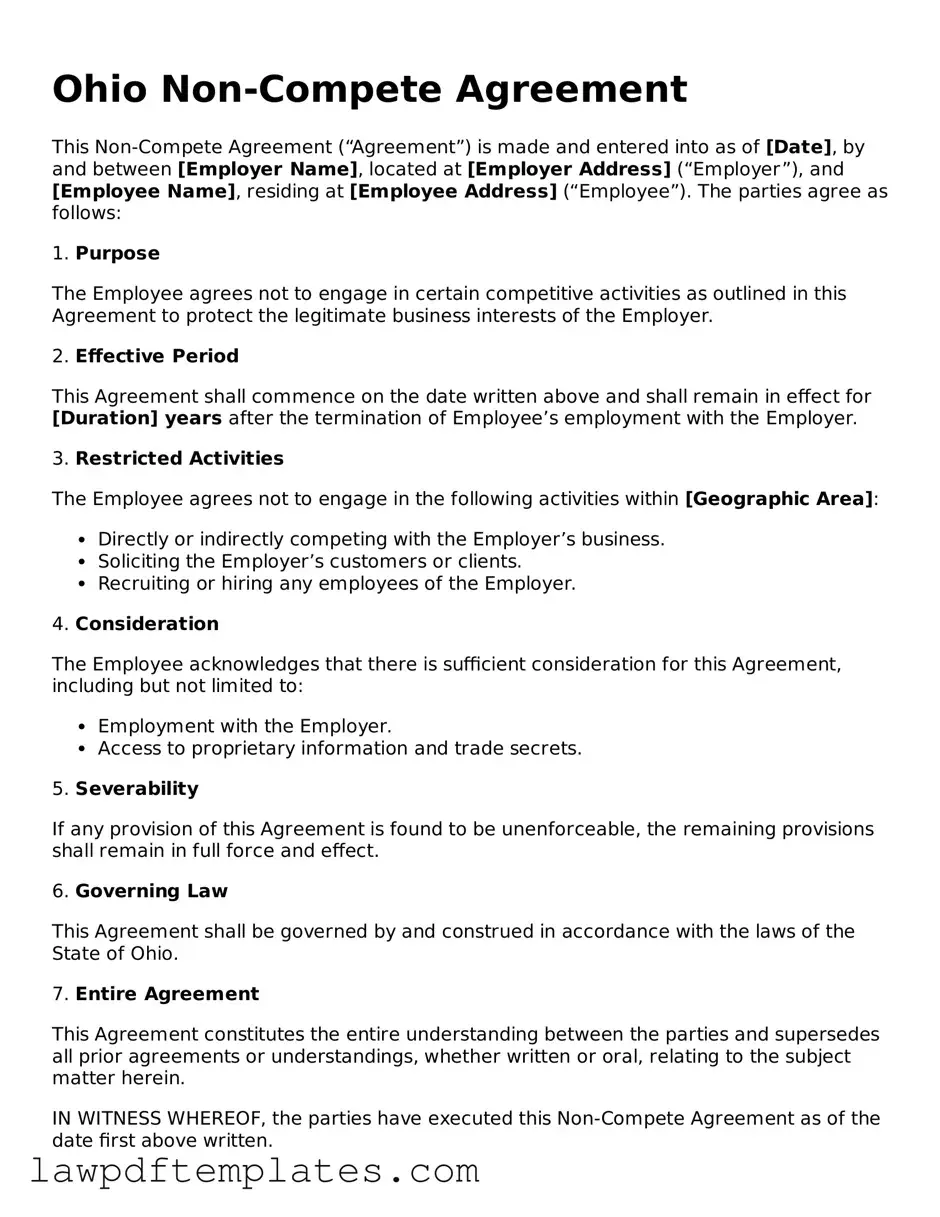Free Non-compete Agreement Template for the State of Ohio
Form Breakdown
| Fact Name | Description |
|---|---|
| Definition | An Ohio Non-compete Agreement restricts an employee from working for a competitor after leaving a job. |
| Duration | The agreement can specify a time period, typically ranging from six months to two years, during which the employee cannot compete. |
| Geographic Scope | Non-compete agreements in Ohio must define a reasonable geographic area where the restrictions apply. |
| Consideration | For the agreement to be enforceable, the employee must receive something of value, such as a job offer or training. |
| Governing Law | Ohio law governs non-compete agreements, particularly under the Ohio Revised Code. |
Sample - Ohio Non-compete Agreement Form
Ohio Non-Compete Agreement
This Non-Compete Agreement (“Agreement”) is made and entered into as of [Date], by and between [Employer Name], located at [Employer Address] (“Employer”), and [Employee Name], residing at [Employee Address] (“Employee”). The parties agree as follows:
1. Purpose
The Employee agrees not to engage in certain competitive activities as outlined in this Agreement to protect the legitimate business interests of the Employer.
2. Effective Period
This Agreement shall commence on the date written above and shall remain in effect for [Duration] years after the termination of Employee’s employment with the Employer.
3. Restricted Activities
The Employee agrees not to engage in the following activities within [Geographic Area]:
- Directly or indirectly competing with the Employer’s business.
- Soliciting the Employer’s customers or clients.
- Recruiting or hiring any employees of the Employer.
4. Consideration
The Employee acknowledges that there is sufficient consideration for this Agreement, including but not limited to:
- Employment with the Employer.
- Access to proprietary information and trade secrets.
5. Severability
If any provision of this Agreement is found to be unenforceable, the remaining provisions shall remain in full force and effect.
6. Governing Law
This Agreement shall be governed by and construed in accordance with the laws of the State of Ohio.
7. Entire Agreement
This Agreement constitutes the entire understanding between the parties and supersedes all prior agreements or understandings, whether written or oral, relating to the subject matter herein.
IN WITNESS WHEREOF, the parties have executed this Non-Compete Agreement as of the date first above written.
______________________________
[Employer Name]
By: ____________________________
Title: __________________________
______________________________
[Employee Name]
Common mistakes
When filling out the Ohio Non-compete Agreement form, individuals often overlook crucial details that can affect the enforceability of the agreement. One common mistake is failing to clearly define the scope of the non-compete clause. Without a precise description of the activities restricted, it can lead to confusion and potential legal challenges. It is essential to specify what types of work or services are prohibited after leaving the company.
Another frequent error is neglecting to consider the geographical limitations of the agreement. A non-compete should outline the specific area where the restrictions apply. Many individuals either leave this section blank or make it too broad, which can render the agreement unenforceable. Courts typically favor reasonable geographic limitations that reflect the business's actual interests.
In addition, individuals often forget to include a reasonable duration for the non-compete period. While it might seem tempting to impose a long-term restriction, excessively lengthy durations can be seen as overly burdensome. This can lead to a court invalidating the agreement altogether. It's advisable to keep the duration aligned with the nature of the industry and the position held.
Another common mistake is not considering the consideration given for signing the agreement. In legal terms, consideration refers to what each party gains from the contract. If the employee does not receive something of value in exchange for signing the non-compete, it may not hold up in court. This could be a promotion, a raise, or even access to proprietary information.
Moreover, individuals frequently overlook the importance of reviewing the agreement with legal counsel. Many people assume they understand the implications of the non-compete without seeking professional advice. This can lead to misunderstandings about rights and obligations. Consulting with a legal expert can provide clarity and ensure that the agreement is fair and enforceable.
Lastly, failing to keep a copy of the signed agreement can create significant issues down the line. Individuals may forget the terms or the specific limitations placed upon them, leading to inadvertent violations. Maintaining a personal copy ensures that one can refer back to the terms and conditions when needed, helping to avoid potential legal disputes.
Discover More Non-compete Agreement Templates for Specific States
Non Compete Agreement Michigan Template - In many cases, negotiations regarding the terms of the agreement can occur before signing.
Arizona Non Compete Laws - This agreement can be a vital part of an overall employment package in certain industries.
For those who need a reliable way to document their transactions, utilizing a Washington Bill of Sale is essential, and you can conveniently access the necessary forms at PDF Documents Hub. This will help ensure that all pertinent information is captured accurately, making the transfer of ownership clear and legally binding.
Non Solicitation Agreement Illinois - Having a non-compete agreement can affect negotiations in new job offers down the line.
Nj Non Compete Law - A Non-compete Agreement restricts an employee's ability to work with competitors after leaving their job.
